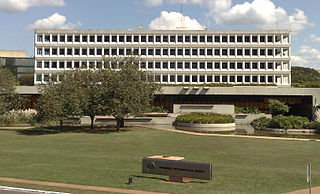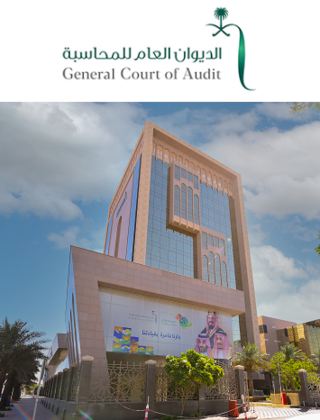
The U.S. Government Accountability Office (GAO) is an independent, nonpartisan government agency within the legislative branch that provides auditing, evaluative, and investigative services for the United States Congress. It is the supreme audit institution of the federal government of the United States. It identifies its core "mission values" as: accountability, integrity, and reliability. It is also known as the "congressional watchdog". The agency is headed by the Comptroller General of the United States. The comptroller general is appointed by the president with the advice and consent of the Senate. When a vacancy occurs in the office of the comptroller general, Congress establishes a commission to recommend individuals to the president. The commission consists of the following:

The National Audit Office (NAO) is an independent Parliamentary body in the United Kingdom which is responsible for auditing central government departments, government agencies and non-departmental public bodies. The NAO also carries out value for money (VFM) audits into the administration of public policy.
Government performance auditing focuses on improving how governments provide programs and services. While there is no one universally agreed upon definition, there are key definitions which capture the scope of government performance auditing. According to the US Government Auditing Standards, "Performance audits are defined as audits that provide findings or conclusions based on an evaluation of sufficient, appropriate evidence against criteria." Additionally, the International Organization of Supreme Audit Institutions defines performance auditing as "an independent examination of the efficiency and effectiveness of government undertakings, programs or organizations, with due regard to economy, and the aim of leading to improvements.

The Supreme Audit Office is the supreme audit institution and also one of the oldest state institutions in Poland, created under the Second Republic on February 7, 1919, barely 3 months after the restoration of Poland's independence. It was created on the initiative of the Head of State, Józef Piłsudski. Its organisation and functioning are set out in the Constitution of the Republic of Poland and the NIK Act of 23 December 1994. The NIK is subordinate to the Sejm and it acts in accordance with the principle of collegial responsibility. The NIK is headed by the President who is appointed by the Sejm for a six-year term of office. The NIK performs audits related to, primarily, the execution of the state budget as well as public finance spending and management of public property by state and local governmental bodies and economic entities. Every year, the NIK submits three key documents to the Sejm: the analysis of the state budget execution and monetary policy guidelines, the opinion on the vote of discharge for the Council of Ministers and the annual report on the NIK’s activity.

International Standards on Auditing (ISA) are professional standards for the auditing of financial information. These standards are issued by the International Auditing and Assurance Standards Board (IAASB). According to Olung M, ISA guides the auditor to add value to the assignment hence building confidence of investors.
An auditor general, also known in some countries as a comptroller general or comptroller and auditor general, is a senior civil servant charged with improving government accountability by auditing and reporting on the government's operations.

The Brazilian Federal Court of Accounts is Brazil's federal audit office. It provides assistance to the Congress of Brazil in its Constitutional duty to exercise external audit over the Executive Branch. Its members, known as Ministers, are appointed by the National Congress and the President of Brazil. The TCU employs a highly qualified body of civil servants to prevent, investigate and sanction corruption and malpractice of public funds, with national jurisdiction.

The International Organization of Supreme Audit Institutions (INTOSAI) is an intergovernmental organization whose members are supreme audit institutions. Nearly every supreme audit institution in the world is a member of INTOSAI. Depending on the type of system used in their home country, the members of INTOSAI may be variously titled the Chief Financial Controller, the Office of the Comptroller General, the Office of the Auditor General, the Court of Accounts, or the Board of Audit.
A supreme audit institution is an independent national-level institution which conducts audits of government activities. Most supreme audit institutions are established in their country's constitution, and their mandate is further refined in national legislation. Supreme audit institutions play an important role in providing oversight and accountability in a country by monitoring the use of public funds and reviewing the quality and accuracy of government financial reporting. They also contribute to anti-corruption efforts. Depending on the country, a supreme audit institution may be called a court of audit, auditor-general or the board of audit. Nearly every supreme audit institution in the world is a member of the International Organization of Supreme Audit Institutions, which works to establish and disseminate international standards and good practices.

The Office of the Comptroller and Auditor General of Bangladesh (C&AG) is the Supreme Audit Institution (SAI) of the country. Like the SAIs in many other countries across the world the institution is established by the Constitution of Bangladesh. This institute is responsible for maintaining accounts of the republic and audits all receipts and expenditure of the Government of Bangladesh, including those of bodies and authorities substantially financed by the government. The reports of the CAG are discussed by the Public Accounts Committee, which is a standing committee in the Parliament of Bangladesh.

Shashi Kant Sharma is a retired central civil servant of 1976 batch under IAS cadre belonging to Bihar. He was the Comptroller and Auditor General of India. In July 2014 he assumed office as a Member of the United Nations Board of Auditors. On 11 January 2017, Sharma took over as the Chairman of the United Nations Board of Auditors. The reports of the Board serve as a key input for policy making within the UN.
Vijayendra Nath Kaul was the tenth Comptroller and Auditor General of India (CAG) from 2002 to 2008. He was awarded the Padma Bhushan in 2014.
The State Audit Office of the Republic of Latvia is a public auditing body overseeing the finances of national and local government in Latvia. It was first created in 1918, and re-established in 1992 when Latvia again became independent.
The Organization of Latin American and Caribbean Supreme Audit Institutions (OLACEFS) is an international, autonomous, independent, apolitical and permanent organization. Its origins can be traced back to the First Congress of Latin American Supreme Audit Institutions - CLADEFS - held in 1963 in Caracas, Venezuela, in response to the need for a forum for exchanging ideas and experiences relating to government control, and for promoting cooperation and development between supreme audit institutions. At the Congress it was recommended that a Latin American Institute of Fiscal Control be created to carry out specialized research and serve as a center for information, education, coordination and mutual assistance between audit institutions.

The INTOSAI Development Initiative is a body of the International Organization of Supreme Audit Institutions (INTOSAI) which supports capacity development of supreme audit institutions (SAIs) in developing countries. Founded in 1986, the organization was headquartered in Canada until 2001, when it moved to Norway. It is currently hosted by the Office of the Auditor General of Norway.
The Chamber of Accounts of the Republic of Azerbaijan is a supreme audit institution, the highest financial control authority of the Republic of Azerbaijan.

Matanyahu Englman is the State Comptroller and Ombudsman of the State of Israel. He is also the first vice-president of EUROSAI, the European Organization of Supreme Audit Institutions. He is slated to become president of the organization in 2024.

The Ghana Audit Service is an independent government agency in Ghana that is responsible for carrying out the audits on the accounts of the Government, Regions as well as the activities of the Ministries, Departments, Agencies and Companies under the Government of Ghana. Both the Office of the Auditor-General of Ghana and the Ghana Audit Service were established by the 1992 Constitution of Ghana. Internationally, the equivalent of the Ghana Audit Service is referred to as the Supreme Audit Institution (SAI). The International Organization of Supreme Audit Institutions (INTOSAI) is the international board that oversees and creates benchmark for auditing public entities for all Supreme Audit Institutions including Ghana who are also members.

Gamaliel Asis Cordoba is a Filipino lawyer who was the longest-serving Commissioner of the National Telecommunications Commission (NTC) from 2009 until 2022. He is currently the Chairperson of the Commission on Audit (COA) replacing former Solicitor General Jose Calida. His appointment was confirmed by the Commission on Appointments (CA) on November 29, 2022.

The General Court of Audit (GCA) is the supreme audit institution of the Kingdom of Saudi Arabia. It is an independent body that reports directly to the Custodian of the Two Holy Mosques.














